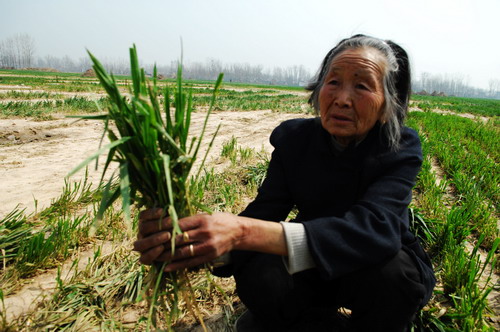 |
|
|
|
|||||||||||
|
 |
|
Hu Zhen, a 78-year-old woman, shows a wheat crop destroyed by property developers in Jingzhuang village of Shangcai county, Henan province, on March 27. [Photo/China Daily] |
Wheat fields plowed under to build school
The seizure of farmland in which wheat fields were plowed under by a developer in Central China's Henan province has led to an investigation after the incident led to public outrage on the Internet.
Zhao Siyin, head of the land appropriation department of the land and resources bureau in Shangcai county, told China Daily on Tuesday that a wheat crop was bulldozed on 56 mu (3.75 hectares) of farmland in a suburban section of Jingzhuang village on March 20 without the bureau's approval.
A team dispatched by the central government arrived in the county on Monday afternoon, and the local government is cooperating with the team to look into the case, Zhao said.
The wheat output in Henan reached 313 million kg in 2011, accounting for 25 percent of the country's total yield, Xinhua News Agency reported.
Jing Hanjun, Party secretary of Jingzhuang village, said the county government planned to build a school on the farmland to ease a shortage of middle school classrooms, and a real estate developer was awarded the contract for the project.
Jing said in order to finish the project as soon as possible and have the school ready for the autumn semester, he allowed the developer to bulldoze the farmland without receiving approval from the county government or the villagers' approval.
"I apologized to the villagers on March 24 and promised to compensate their losses from the destroyed wheat at the price of 1,000 yuan ($158) per mu," Jing told China Daily on Tuesday.
The school is planned to be built on 300 mu Jingzhuang farmland. Villagers whose farmland is seized will be compensated 33,500 yuan per mu if they sign contracts with the government, Jing said.
"More than 90 of the 125 families involved have signed contracts to allow the land seizure," Jing said. "Building a school in the village will benefit the local people, whose children will have an easier time getting to school."
Not all of the villagers supported the land acquisition. Some took photos of the destroyed wheat and gave the photos to reporters who went there to cover the story.
Zhou Jianxiang, 46, who gave up 8 mu of farmland in Jingzhuang for the project, said the compensation was too low.
"The standard of the compensation, 33,500 per mu, is far from enough. Even a migrant worker could earn that much annually," he complained. "But if we lose the farmland, we will never get it back again."
Hu Zhen, 78, whose wheat was destroyed by the bulldozer, said she worried about her future life without the farmland.
"The wheat had already grown this high before it was destroyed," she pointed at her legs. "My heart broke the next day when I discovered the mess in the land."
Nearly all of the 17 people in her family lost their farmland. She did not know how she could support herself after the compensation money was spent.
"I don't agree with the land acquisition deal," she said and added that she had been pressured by village officials to sign the contract.
Jing Hanjun denied that he and other officials had pressured villagers.
"As a Party official elected by the villagers, I dare not bully them at all," he said.
The local government has suspended construction on the school. The developer and the officials responsible for plowing under the wheat will be punished, said Zhao, the county land official.
Xiang Mingchao and Chang Cheng in Zhengzhou contributed to this story.
anbaijie@chinadaily.com.cn